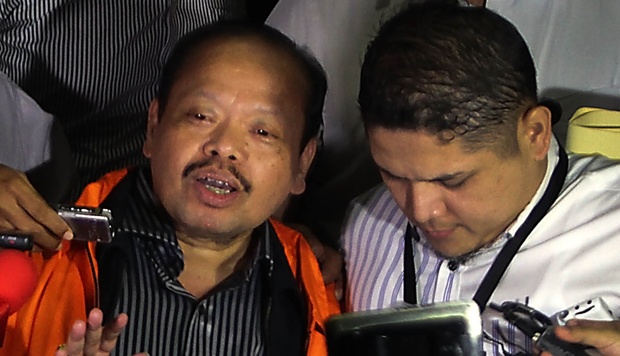Berita Terkait
- Anggaran DPR RI Tahun 2016-2018
- Kehadiran Anggota DPR Pada Masa Sidang Ke-2 Tahun 2017-2018
- Review Kinerja DPR-RI Masa Sidang ke-2 Tahun 2017-2018
- Fokus DPR Masa Sidang ke-3 Thn 2017-2018
- Konsentrasi DPR Terhadap Fungsinya Pada Masa Sidang ke - 3 Tahun 2017 – 2018
- Kehadiran Anggota DPR RI Masa Sidang ke-3 Tahun 2017-2018
- Review Kinerja Masa Sidang Ke-3 Tahun 2017-2018
- Konsentrasi DPR Terhadap Fungsinya Pada Masa Sidang ke - 4 Tahun 2017– 2018
- Peristiwa Menarik Masa Sidang ke-4 Tahun 2017-2018 (Bidang Legislasi)
- Peristiwa Menarik Masa Sidang ke-4 Tahun 2017-2018 (Bidang Pengawasan)
- Peristiwa Menarik Masa Sidang ke-4 Tahun 2017-2018 (Bidang Keuangan, Lainnya)
- Review Kinerja DPR-RI Masa Sidang ke-4 Tahun 2017-2018
- (Tempo.co) Kasus Patrialis Akbar, KPPU: UU Peternakan Sarat Kepentingan
- (Tempo.co) Ini Proyek-proyek yang Disepakati Jokowi-PM Shinzo Abe
- (Tempo.co) RUU Pemilu, Ambang Batas Capres Dinilai Inkonstitusional
- (Media Indonesia) Peniadaan Ambang Batas Paling Adil
- (DetikNews) Besok Dirjen Pajak Panggil Google
- (Tempo.co) Aturan Komite Sekolah, Menteri Pendidikan: Bukan Mewajibkan Pungutan
- (Rakyat Merdeka) DPR BOLEH INTERVENSI KASUS HUKUM
- (Aktual.com) Sodorkan 4.000 Pulau ke Asing, Kenapa Pemerintah Tidak Menjaga Kedaulatan NKRI?
- (RimaNews) Pimpinan MPR dan DPR akan bertambah dua orang
- (Warta Ekonomi) Jonan Usulkan Kepada Kemenkeu Bea Ekspor Konsentrat 10 Persen
- (Tempo.co) Eko Patrio Dipanggil Polisi, Sebut Bom Panci Pengalihan Isu?
- (TigaPilarNews) DPR Harap Pemerintah Ajukan Banyak Obyek Baru untuk Cukai
- (Tempo.co) Menteri Nasir: Jumlah Jurnal Ilmiah Internasional Kita Meningkat
Kategori Berita
- News
- RUU Pilkada 2014
- MPR
- FollowDPR
- AirAsia QZ8501
- BBM & ESDM
- Polri-KPK
- APBN
- Freeport
- Prolegnas
- Konflik Golkar Kubu Ical-Agung Laksono
- ISIS
- Rangkuman
- TVRI-RRI
- RUU Tembakau
- PSSI
- Luar Negeri
- Olah Raga
- Keuangan & Perbankan
- Sosial
- Teknologi
- Desa
- Otonomi Daerah
- Paripurna
- Kode Etik & Kehormatan
- Budaya Film Seni
- BUMN
- Pendidikan
- Hukum
- Kesehatan
- RUU Larangan Minuman Beralkohol
- Pilkada Serentak
- Lingkungan Hidup
- Pangan
- Infrastruktur
- Kehutanan
- Pemerintah
- Ekonomi
- Pertanian & Perkebunan
- Transportasi & Perhubungan
- Pariwisata
- Agraria & Tata Ruang
- Reformasi Birokrasi
- RUU Prolegnas Prioritas 2015
- Tenaga Kerja
- Perikanan & Kelautan
- Investasi
- Pertahanan & Ketahanan
- Intelijen
- Komunikasi & Informatika
- Kepemiluan
- Kepolisian & Keamanan
- Kejaksaan & Pengadilan
- Pekerjaan Umum
- Perumahan Rakyat
- Meteorologi
- Perdagangan
- Perindustrian & Standarisasi Nasional
- Koperasi & UKM
- Agama
- Pemberdayaan Perempuan & Perlindungan Anak
- Kependudukan & Demografi
- Ekonomi Kreatif
- Perpustakaan
- Kinerja DPR
- Infografis
(Tempo) Legislators Martyr-Dumb

Now that he is officially detained, Democrat Party politician Sutan Bhatoegana should spend less time on his defence and more on providing information about corruption in the House of Representatives (DPR). In his upcoming trial, he is expected to reveal which of his fellow legislators in the Energy Commission are involved in financial shakedown schemes.
Sutan was arrested by the Corruption Eradication Commission (KPK) on charges of bribery involving Rudi Rubiandini, former chairman of the Oil and Gas Upstream Regulatory Special Task Force (SKK Migas). Rudi was proven not only to have accepted bribes from oil and gas contractors, but also to have given in to demands by Sutan that the bribe money to the Energy Commission members be recorded as their 2013 holiday bonus.
Sutan, who led the Energy Commission, gave Rudi US$200,000 through Tri Yulianto, a colleague and fellow party member, at a fruit store in South Jakarta. Tri has denied the charges although he admitted to meeting Rudi and then meeting with Sutan and Johni Allen, also a Democrat Party politician, at a restaurant in July 2013.
After questioning Sutan five times, the KPK was finally convinced that Sutan took the bribes. The KPK also suspected that the 'holiday bonus' requested by Sutan, was also given by Rudi to other members of the DPR Energy Commission. In all likelihood, the bounty was shared not only with Democrat Party legislators but also those from other parties.
The former finance bureau chief of the Energy and Mineral Resources Ministry, Didi Dwi Sutrisnohadi admitted to giving a bag of envelopes containing US$140,000. He said the money was intended for the leaders, members and secretariat of Commission VII. Even Irianto, Sutan's special staff, had signed a receipt for the money.
The Energy Commission has long been known to sell favors. In order to win government tenders, oil and gas businesspeople would sidle up to Commission members and ask to arrange meetings with officials. They were then able to press government officials to win tenders for particular clients, or get profitable concessions for certain companies. Rudi Rubiandini, an intellectual who should have known better and who should have gotten rid of such plots, was actually used as a pivotal part of the conspiracy.
The rot has been around for some time, long before the 'era' of Sutan and Rudi Rubiandini. Bribe money goes either to individual pockets or to party coffers. But if Sutan decides to 'sing' in court, he will at least help in identifying the people involved, which could lead to the beginnings of a major exposure of the Energy Commission's 'culture of corruption'. Sutan should quit being the martyr and bear the sins all by himself. It is no longer the time to cover up the Energy Commission's 'dirty mask'.
If he wants people to quit disparaging him, Sutan should opt to become a justice collaborator. We sincerely hope that Sutan will spill the beans on the people who took the bribes, along with the proof. To be sure, it will not be pleasant, but that would certainly help to enforce the law.